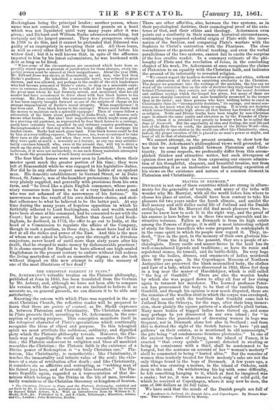THE CHRISTIAN ELEMENT IN PLATO. * Da. ACKERMAxN'S valuable treatise on
the Platonic philosophy, published at Jena in 1835, has been translated from the German by Mr. Asbury, and, although we have not been able to compare his version with the original, yet we are inclined to believe it as accurate as, on general grounds, we can discern it to be able and satisfactory.
Knowing the esteem with which Plato was regarded in the an- cient Christian Church, the reflective reader will be prepared to learn that there are points of contact, as Dr. Shedd expresses it, between Platonism and Christianity. The Christian element in Plato presents itself, according to Dr. Ackermann, in the con- ception of a saving purpose. This conception manifests itself in the teleogical character of Plato's speculations which continually recognize the ideas of object and purpose. To this teleogical spirit we must attribute the nobleness, sublimity, and dignified piety which the Platonic philosophy reveals. Moreover, the Pla- tonic way of regarding the world and man resembles the Chris- tian ; the Platonic endeavour to enlighten and bless all mankind resembles the Christian ; the Platonic faith in the existence of a Divine power of Redemption is "a truly Christian one." Pla- tonism, like Christianity, is monotheistic ; like Christianity, it teaches the immortality and infinite value of the soul ; the exis- tence of a state of retribution after death ; and like Christianity, it considers sin as afflictive and corrupting, as "robbing man of his fairest joys here, and of heavenly bliss hereafter." The Pla- tonic Republic again, regarded as a representation of that do- minion which belongs to the Divine in the life of man, involun- tarily reminds us of the Christian theocracy or kingdom of heaven.
• The Christian Element in Plato and the Platonic Philosophy, unfolded and set forth by Dr. C. Ackermann, Archdeacon at Jena. Translated from the German by Samuel Ralph Asbury, S.A. With an Introductory Note by William G. T. Shedd, D.D., Pro. Published by T. and T. Clark, Edinburgh ; Hamilton, Adams, and Co., London ; John Robertson, Dublin.
There are other affinities, also, between the two systems, as in their psychological doctrine, their cosmological proof of the exis- tence of God, and their ethics and theology. Ackermann even points out a similarity in their common historical circumstances, contrasting the supposed celestial origin of Plato with the incar- nation of the Saviour, and comparing Plato's warfare with the Sophists to Christ's contention with the Pharisees. The close resemblance of the general ethical teaching, and even the verbal parallelisms of the two systems, cannot fail to excite the surprise of the less erudite reader. In a summary estimate of the phi- losophy of Plato and the revelation of Jesus, in the concluding chapter of his work, Dr. Ackermann at once recognizes the claims of Platonism to an equality with the Christian faith, and indicates the ground of its inferiority to revealed religion.
" We cannot regard the heathen doctrines of religion and ethics, without inward admiration of their often surprising similarity to the Christian. The deeper we penetrate into the writings of the ancients, the lees can we ward off the conviction that on the side of doctrine they truly stand but little behind Christianity ; they contain not only almost all the moral doctrines and sublime savings which the Gospel has given, but many of these are even more sharply conceived and more beautifully presented in the former than in the latter ; and those persons who have nothing better to extol in Christianity than its "incomparable doctrines," its sayings, and moral sen- tences, do not know what they are doing or saying. It is truly not doctrine which raises Christianity high above all that history has formed or diffused as religion. Noble and Divine truths have been taught by non-Christian sages in almost the same purity and elevation as by the Founder of Chris- tianity, whom it is intended very greatly to honour when he is called the Sage of Nazareth. But the superiority in idea and feeling, the real life and love of the Holy One on earth, the incarnation of the Divine Word—this, no philosophy or speculation in the world can effect like Christianity, since, indeed, the proper creation of life is placed in no man's power or might, and least of all in that of abstraction."
We cannot attempt, on the present occasion, to show how far we think Dr. Ackermann's philosophical views well grounded, or how far we accept his parallel between Platonism and Chris- tianity. In some respects, we profoundly differ from this accom- plished thinker and attractive writer, but such divergence of opinion does not prevent us from expressing our sincere admira- tion of his thoughtful, eloquent, and beautiful treatise, nor from recommending it as an instructive and fascinating exposition of his views on the existence and nature of a common element in Platonism and Christianity.


























 Previous page
Previous page